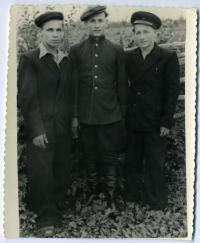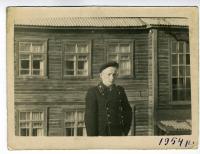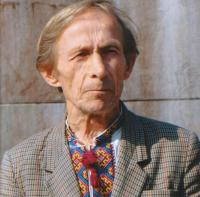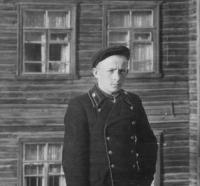„They asked me about clemency - I refused. Therefore, I was the last to be released in 1990, in November, when the whole world was demanding to set me free“

Stáhnout obrázek
Bohdan Klymchak was born on July 22nd, 1937, in the village of Sebechiv, Lviv province (now Sokal district, Lviv region). He studied at the elementary school in his native village (in the first and the second grades). On May 20th, 1946, he was deported together with his family to Ternopil region (Bohdan Klymchak’s native village as well as other villages that belonged to Zabuzkyi (now Sokal) region became the territory of Poland, while people who lived in this territory were deported in cattle-wagons and were forced to settle in a neighboring region). The family settled in the village of Hrymayliv, Husyatyn district, Ternopil region. In the autumn of 1946 Bohdan went to the second grade for the second time since he did not have any official document that would certify the fact that he went to the second grade in Sebechiv. In 1949 Bohdan together with his mom and two sisters as a family of a OUN member (older brother Myron was sentenced to 25 years of concentration camps for cooperation with the OUN) were kept for a month in a transit prison in Kopychyntsi, Ternopil region. From the transit prison the family was deported to a special settlement in Khabarovsk region (“posyolok Udarnyi”, a district named after Lazo). In 1950 with the permission of the special authorities the family moved to the station “64 km” in the same region, where the boy continued his education at a local school until the 5th grade. In 1952 they moved to the station “Durmin” (“61 km”) where Bohdan finished 7 grades. In 1953-1957 he studied at Magadan mining technical college. In 1957 Bohdan’s brother was released and his family was set free. But Bohdan did not come back home. The day after his graduation he was arrested and sentenced according to the article 58-10 of the Criminal Codex of the Russian Socialist Federative Soviet Republic (“anti-Soviet propaganda”) to 5 years of concentration camps. He served his sentence in Magadan region, on the Tayshetsky road in Irkutsk region, in Mordoviya. He was released on June 15th, 1962. From 1962 to 1978 he was free, but under constant surveillance of the KGB. He made an attempt to run away through the territory of Iran to the West, aiming to ask for a political asylum. He crossed Soviet-Iranian border in the region of Takyr (Turkmenistan), but after 9 days, on October 1st, 1978, as a result of an agreement between Iran and the USSR he was forced to come back to the Soviet Union. On June 18th, 1979, he was sentenced by Lviv regional court according to the article 62, part 1 of the Criminal Codex of the Ukrainian SSR and the article 62, part 1 of the Criminal Codex of the Turkmen SSR (“anti-Soviet agitation and propaganda”, “treason”) to 15 years of strict-regime camps and 5 years of exile. He served his sentence in Perm camps ВС-389/36 and 35. During 12 years of imprisonment he spent 590 days in punitive isolation ward, 10 months in a camp prison. In 1981-1984 he was sentenced to 3 years in a special prison in Chystopol (Tatarstan). In 1987 he refused to sign any kind of document that could have been a condition for his release. He was released on November 11th, 1990. After the release he lived for some time in Kyiv, Ternopil, then he settled in Lviv. He is one of the last political prisoners of the Ukrainian SSR. He was not rehabilitated. He is a writer. Now, he lives in Lviv.

![The Klymchak family with neighbors in a special settlement (station "Durmin"). District named after Lazo, Khabarovsk region, [1952-1956]](https://www.pametnaroda.cz/sites/default/files/styles/witness_gallery/public/witness/3443/photo/12806-photo.jpg?itok=4scT0c9B)


